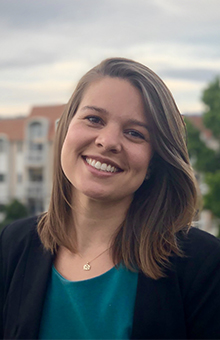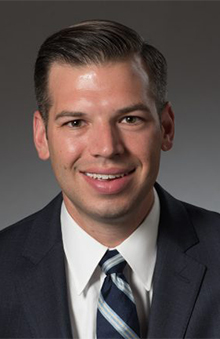
Two Mission-Driven Organizations Come Together
The Broad Center in Los Angeles is currently being transformed into The Broad Center at Yale SOM, which will continue to offer programs to bolster public education leadership. We talked with former Broad Center staffer Sarah Thompson ’21 and alumnus Joe Gramelspacher ’21, who have found at Yale SOM an environment that complements TBC’s focus on promoting educational equity.
The Broad Center’s move to Yale SOM brings together two mission-driven organizations and the dedicated communities that have formed around them. We talked to two students who bridge those communities: Sarah Thompson ’21, who was a member of the Broad Center recruitment and selection staff before enrolling in the Yale SOM MBA program, and Joe Gramelspacher ’21, also an MBA student, who is an alumnus of The Broad Residency in Urban Education and formerly an educator and special projects director for Indianapolis Public Schools. Thompson and her team supported Broad Residents like Gramelspacher, whose careers focus on moving urban public school systems toward more equitable student outcomes.
What values do the Yale SOM and Broad Center communities share? How have you seen the two communities put those values into action?

Sarah Thompson: The first things that come to mind are honestly the words in your question—values and community. You can’t make it through a day of classes, meetings, or events at SOM without hearing “Business and Society.” I’m not sure I’ve ever experienced a mission statement being so embraced by its community and so infused in all we do at SOM. The Broad Center network is the most mission- and values-driven group of people I’ve ever met. They also don’t let a day go by without grounding their decisions and actions in their beliefs about what teachers and children deserve. They understand and examine the connection between their daily work and the impact it has on racial equity and access for all public schools.
I’ve found that both communities are strong places for connection, as well. The Broad Center network is known for taking each other’s calls, whether they’ve met in person or just have a shared connection through Broad. I’d always encourage new staff at The Broad Center to reach out and ask for meetings or coffee chats with anyone they’d like, because it was a place where everyone wanted to meet, support, and help each other. Now I tell the same thing to prospective students at SOM. The number of students, staff, and faculty members who’ve sat down to have coffee and share their thoughts and experiences with me, even before we’ve met officially, is higher than I can count.

Joe Gramelspacher: Yale SOM and The Broad Center are both defined by the incredible people that comprise the community. Both SOM and TBC are filled with purpose-driven leaders who want to use management as a tool to make the world a better place. What I’ve seen from peers is a commitment to intellectual curiosity and rigorous discourse—a shared understanding that hard decisions are hard for a reason, and that they require evaluation and consideration of multiple stakeholder perspectives.
Reflecting on your first year as an MBA student, what have you learned at Yale SOM that supplements the insights from your work in the education field?
Joe Gramelspacher: I think I’ve gained a greater appreciation for the fact that many of the challenges faced by educational organizations are more common than I would’ve thought across all sectors. One example that comes to mind is from the Workforce course. We had a lengthy discussion on how incentive systems can fail to achieve their goals if they aren’t well designed and aligned with all of the other facets of human capital management across the organization. Talent attraction and retention is a huge challenge in public education, and it was interesting to think about how many other types of organizations address similar challenges.
Sarah Thompson: Firstly, my exposure to classmates with more education experience than me has widened my vision—I have friends who bring deep knowledge of early childhood education, social emotional learning, and of working in classrooms. That kind of experience is crucial in any conversation about the education field, and I’m really grateful it exists in the student body here. The other pieces are harder to name; most people familiar with education acknowledge that school systems are organizations and therefore good management and leadership practices in general can often apply to the education field. But we also know that simply because a structure, incentive, or tactic is effective in the corporate sector does not mean it’s appropriate or effective in education. My first year at SOM—particularly through some of the cases discussed in core classes—has continued to bring nuance to my understanding of which approaches that work outside of education are applicable. At the same time, I have more clarity around some of the specific characteristics that make, and should keep, education exceptional in the world of management skills.
Tell us about the community of students with an interest in education at Yale SOM. What does the arrival of the Broad Center mean to that group?
Joe Gramelspacher: The Broad Center will bring a powerful network of education practitioners to Yale SOM. TBC also has a treasure trove of data about the management challenges specific to public education, which should be an invaluable source of information for scholars at Yale SOM to study. I’m excited by the promising combination of Broad’s deep knowledge of educational leadership with Yale’s world-class research faculty.
Sarah Thompson: We are a small but mighty group. Conversations with these students were highlights of my first year; they bring experience from a wide range of education careers and are generous with sharing their perspectives. They believe that communities are the key stakeholders and should be the key drivers of school systems. They are also, to a person, committed to addressing issues of racism and racial inequity in education. They’re excited about The Broad Center coming to SOM for the like-minded people it will bring to Evans Hall and hopeful to see a level of overlap and integration between SOM students and practitioners in the field that are hallmarks of a Yale program.
